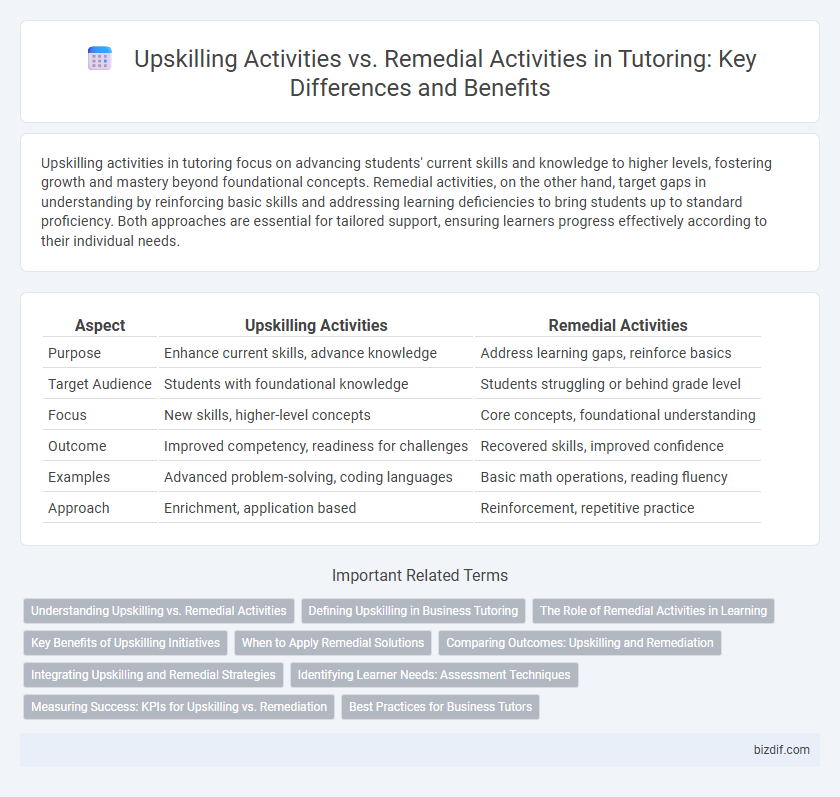Upskilling activities in tutoring focus on advancing students' current skills and knowledge to higher levels, fostering growth and mastery beyond foundational concepts. Remedial activities, on the other hand, target gaps in understanding by reinforcing basic skills and addressing learning deficiencies to bring students up to standard proficiency. Both approaches are essential for tailored support, ensuring learners progress effectively according to their individual needs.
Table of Comparison
| Aspect | Upskilling Activities | Remedial Activities |
|---|---|---|
| Purpose | Enhance current skills, advance knowledge | Address learning gaps, reinforce basics |
| Target Audience | Students with foundational knowledge | Students struggling or behind grade level |
| Focus | New skills, higher-level concepts | Core concepts, foundational understanding |
| Outcome | Improved competency, readiness for challenges | Recovered skills, improved confidence |
| Examples | Advanced problem-solving, coding languages | Basic math operations, reading fluency |
| Approach | Enrichment, application based | Reinforcement, repetitive practice |
Understanding Upskilling vs. Remedial Activities
Upskilling activities focus on enhancing existing skills and acquiring advanced knowledge to improve academic performance and future readiness, while remedial activities aim to address foundational gaps and reinforce basic concepts missed in earlier learning. Upskilling often involves targeted enrichment and skill development, whereas remedial efforts center on correction and recovery of essential skills to meet grade-level standards. Effective tutoring programs balance both approaches to ensure comprehensive student growth and sustained educational progress.
Defining Upskilling in Business Tutoring
Upskilling in business tutoring involves enhancing learners' existing skills to meet evolving industry demands, focusing on advanced competencies like data analysis, strategic planning, and digital marketing. These activities differ from remedial tutoring, which targets foundational knowledge gaps or skill deficits to bring learners up to standard proficiency. Effective upskilling programs drive employee performance, innovation, and adaptability, aligning business success with continuous professional development.
The Role of Remedial Activities in Learning
Remedial activities play a critical role in addressing gaps in foundational knowledge, enabling students to overcome specific learning challenges and build a solid academic base. These activities focus on reinforcing essential skills and concepts, which is crucial for improving overall performance and boosting confidence in subjects such as mathematics and reading. Research shows that targeted remedial tutoring can significantly enhance learning outcomes by providing personalized support tailored to individual student needs.
Key Benefits of Upskilling Initiatives
Upskilling initiatives in tutoring enhance students' critical thinking and adaptability by introducing advanced concepts tailored to their current skill level. These activities promote long-term academic growth and better prepare learners for future challenges, distinguishing them from remedial interventions focused solely on addressing gaps. Key benefits include improved confidence, higher engagement, and the development of independent learning skills.
When to Apply Remedial Solutions
Remedial tutoring solutions are essential when students exhibit gaps in foundational knowledge that impede current learning progress. These activities focus on diagnosing specific weaknesses and providing targeted interventions to ensure mastery of prerequisite skills. Applying remedial support promptly prevents further academic decline and prepares students for successful engagement in advanced topics.
Comparing Outcomes: Upskilling and Remediation
Upskilling activities in tutoring enhance a learner's existing skills, leading to improved competence and confidence in subject mastery, while remedial activities target specific knowledge gaps to bring students up to standard proficiency levels. Research shows that upskilling promotes long-term academic growth and fosters independent learning habits, whereas remediation primarily addresses immediate learning deficiencies with less impact on overall cognitive development. Combining both methods strategically optimizes educational outcomes by balancing knowledge reinforcement and skill advancement.
Integrating Upskilling and Remedial Strategies
Integrating upskilling and remedial activities in tutoring enhances personalized learning by addressing skill gaps while promoting advanced knowledge acquisition. Tailored lesson plans that combine foundational skill reinforcement with challenging tasks improve student engagement and retention. This hybrid approach leverages diagnostic assessments to balance remediation with skill development, driving comprehensive academic growth.
Identifying Learner Needs: Assessment Techniques
Effective identification of learner needs in tutoring relies on precise assessment techniques like diagnostic tests, formative quizzes, and one-on-one interviews to distinguish between upskilling activities and remedial support. Diagnostic assessments reveal knowledge gaps and skill strengths, enabling tutors to tailor upskilling for advanced learners and remedial activities for those requiring foundational reinforcement. Continuous progress monitoring through formative assessments ensures responsive adjustments to instructional strategies that align with each learner's evolving needs.
Measuring Success: KPIs for Upskilling vs. Remediation
Key performance indicators (KPIs) for upskilling activities include skill proficiency growth, certification attainment rates, and application of new skills in practical scenarios, reflecting advancement and future readiness. Remedial activities are measured by improvement in foundational knowledge, error reduction rates, and recovery speed to grade-level competency, emphasizing gap closure and mastery of basics. Successful tutoring programs use these distinct KPIs to tailor interventions, maximize learner outcomes, and ensure targeted progress tracking for both upskilling and remediation.
Best Practices for Business Tutors
Effective business tutors tailor upskilling activities to enhance learners' advanced skills in areas like financial analysis and strategic planning, employing real-world case studies and interactive simulations. Remedial activities focus on identifying and addressing foundational gaps in knowledge, using diagnostic assessments and personalized learning plans to ensure comprehension of core concepts such as basic accounting principles. Integrating data-driven feedback mechanisms and adaptive learning technologies optimizes both upskilling and remedial interventions, improving learner outcomes and driving measurable business performance improvements.
Upskilling Activities vs Remedial Activities Infographic

 bizdif.com
bizdif.com